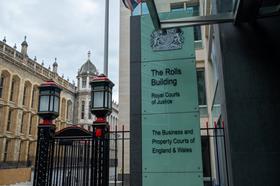A former City solicitor who blew the whistle on a scheme to defraud the Danish government of more than £1.4 billion has expressed anger at spending eight years as a defendant in one of the largest civil claims ever brought before the courts of England and Wales.

Jas Bains, admitted in 2002, was a former head of legal and de facto chief operating officer in Solo Capital, a London hedge fund owned by British trader Sanjay Shah. In 2015 Bains alerted the Danish authorities to the so-called cum-ex fraud. Shah was subsequently extradited from Dubai and last December sentenced to 12 years in prison for depriving the country of taxes worth £1.4 billion between 2012 and 2015. Shah is appealing the conviction.
The fraud involved equities dealing on so-called cum-ex terms, in which a trade is entered into before a dividend declaration date and settled after that date. In a loophole exploited by fraudsters, the Danish Skatteforvaltningen (tax authority) allowed multiple claims for refunds of the 27% tax payable on dividends.
In an English High Court litigation Skatteforvaltningen (SKAT) sought to recover the sums paid out in 4,170 refund claims from some 56 named defendants - including Bains, who has not been charged with any offence, Solo and Shah.
Case management proceedings in Skatteforvaltningen v Solo Capital Partners & Ors began in January 2020; the main trial ran over 33 weeks in the year to April 2025. Giving judgment running to 331 pages last week, Mr Justice Andrew Baker ruled against SKAT. While he rejected Shah's claim to have believed the tax refunds were legitimate - and found Shah's evidence to be 'riddled... with implausible claims and obvious lies', the judge concluded 'the evidence at trial did not persuade me to accept SKAT's claim'. The tax authority had failed to establish that it had suffered loss, the judge said, because its controls on paying out dividend tax refund claims 'were so flimsy as to be almost non-existent'.
Bains, who began his career at magic circle firm Freshfields, comes under criticism from the judge, who 'did not find him very satisfactory as a witness'. Solo's business model had been 'founded upon two basic premises that I would expect a qualified lawyer instinctively to think at least doubtful', the judge observed. These included 'self-fulfilling settlement loops' constructed among parties who never owned any shares, and the assumption that someone who never owned any shares might be entitled to a dividend tax refund. '[Solo] could have done with an independent-minded, serious impartial head of legal, to raise that doubt,' the judge said. 'I do not think Mr Bains was that person.'
Evaluating Bains' evidence, the judge said: 'My assessment was that Mr Bains knows that he did not test the business as he should have tested it, and his evidence was heavily influenced by a strong desire to defelct possible blame away from himself and by a wrong-headed sense of grievance that he is a co-defendant in this civil litigation.'
After the judgment Bains commented: 'This unnecessary trial cost me eight years of my life and I’m grateful to the justice system for exonerating me in what was clearly politically motivated litigation, exacerbated by the greed of lawyers.'
This article is now closed for comment.



























1 Reader's comment